Thomas S. Harrington speaks with Quim Torra about the constitutional crisis in Madrid and the legacy of the Franco regime.
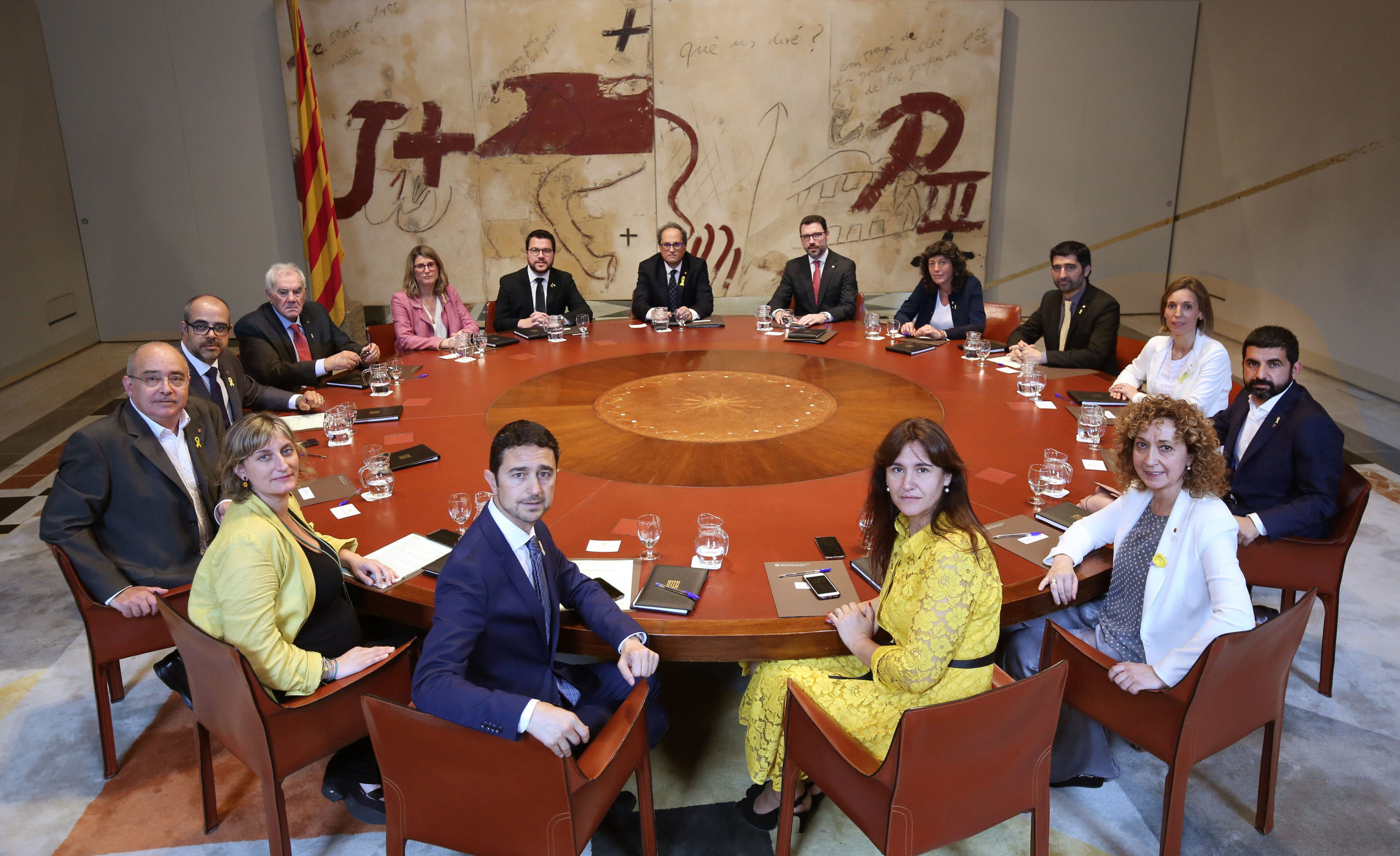
Government of Catalonia (2018–). Quim Torra, president of the Generalitat, is in the background, at the center. (Generalitat de Catalunya, Wikimedia Commons)
By Thomas S. Harrington
The Village
 On Jan. 10, a day after snubbing the European Court of Justice’s order that former Catalan Vice President Oriol Junqueras be released from prison to take his seat in the European Parliament, the Supreme Court of Spain reaffirmed the Central Electoral Commission’s decision to strip Joaquim Torra of his status as a Catalan parliamentary deputy and president of Catalonia.
On Jan. 10, a day after snubbing the European Court of Justice’s order that former Catalan Vice President Oriol Junqueras be released from prison to take his seat in the European Parliament, the Supreme Court of Spain reaffirmed the Central Electoral Commission’s decision to strip Joaquim Torra of his status as a Catalan parliamentary deputy and president of Catalonia.
Torra referred to this move as a coup and reaffirmed that this changes nothing and that he is still the president of Catalonia.
The Catalan conflict is generating a constitutional crisis in Madrid with far-reaching implications for the future of the European Union.
While the Catalan Parliament has been robustly backing Torra, the right-wing Spanish parties Vox and PP have called for Torra’s imprisonment and the suspension of the Catalan statute of autonomy by way of Article 155 of the Constitution — as was done following Catalonia’s declaration of independence on Oct. 27, 2017.
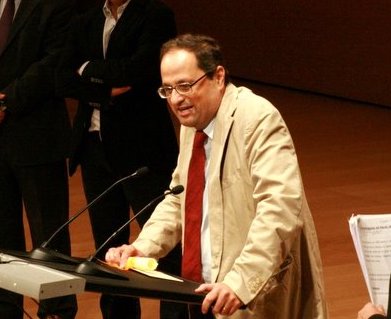
Quim Torra in 2009. (Jomatofa, CC BY-SA 3.0, Wikimedia Commons)
The 58-year-old Torra’s turbulent ride as president began in the spring of 2018. Until two years ago, he was a business executive and cultural activist who had never been involved in electoral politics. However, when the central government dissolved the Catalan Parliament after its vote to secede from Spain, and subsequently ordered new elections, Torra put his name forward as a parliamentary candidate from Together for Catalonia, the party led by exiled President Carles Puigdemont. To the surprise of many and the intense dismay of the Spanish government, the exiled president’s party won the most votes in the majority pro-independence bloc — and hence the right to form a new government.
Madrid was having none of this. In January 2018, when the Catalan Parliament was about to swear Puigdemont in by video connection from Belgium, where he was exiled and still resides, the legislature’s president abruptly stopped the process in reaction to the threat of judicial sanctions he had received from the Spanish courts. After two other candidates were similarly scuttled, it then came down to the largely unknown Torra, who was eventually inaugurated in May 2018. Since assuming office, he has repeatedly made clear that he believes that that his prime goal is to advance Catalonia toward independence in the most expeditious manner possible.
It has not been an easy ride. The Catalan independence movement, comprised of three main factions, Junts per Catalunya, Esquerra Republicana Catalana, and Candidatura d’Unitat Popular. These roughly correspond to the positions of center-right, center-left and far-left on the political spectrum and are wracked with internal divisions.
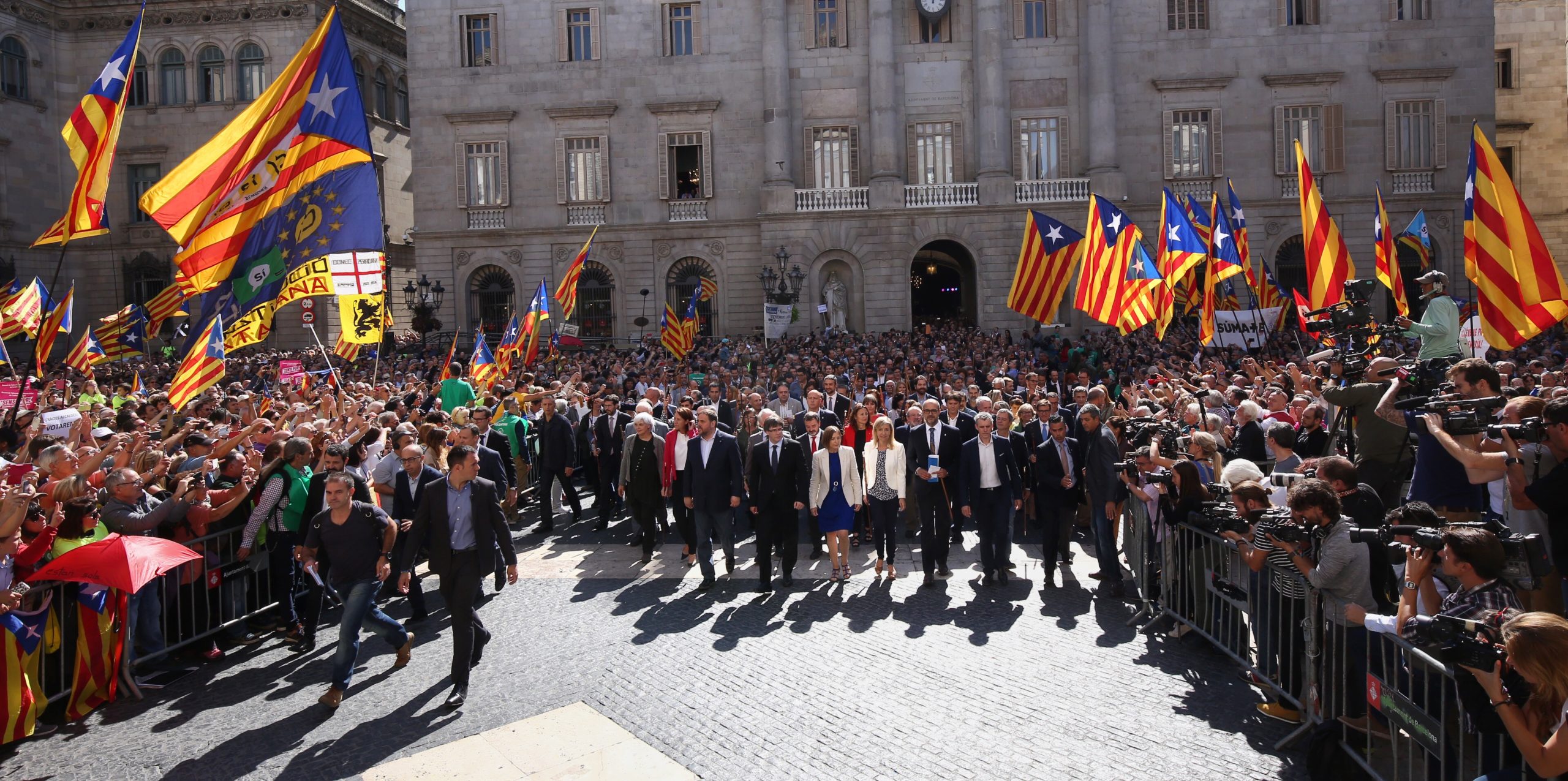
Catalan President Carles Puigdemont and 700 mayors of Catalonia meet to prepare referendum, Sept. 16, 2017. (Generalitat de Catalunya, Wikimedia Commons)
In a seemingly strange inversion of roles, Torra has constantly seen his efforts to speed up the march toward self-determination checked by his center-left coalition partner, ERC, and embraced, though not without reservations, by the far-left CUP. He has also been repeatedly criticized by members of his own group’s traditional base for trying to move things forward too fast.
My interview with Torra, conducted in Catalan late last year and edited in places for brevity, took place in the Palace of the Generalitat (the Catalan government) in Barcelona.
The city was then 16 days into widespread and still ongoing acts of civil disobedience unleashed in reaction to the Spanish Supreme Court’s harsh sentencing of the politicians and civil society leaders responsible for promoting the 2017 independence referendum, 11 days before Spain’s fourth general election in as many years, and 19 days before Torra’s own trial, at which he would unapologetically plead guilty to disobeying Spanish government order to remove a banner hanging on the front of the Generalitat that made reference to Catalan “exiles” and “political prisoners.”
Thomas S. Harrington: How would you explain what is going on in Catalonia today to a reader outside of the situation?
Joaquim Torra: A quick response would be to compare it with a case with which most English- language readers are familiar, which is Scotland. But beyond this loose comparison, I would speak of an ancient nation in Southern Europe that has always demonstrated a firm dedication to the pursuit of liberty, and that, after suffering a number of setbacks the last 300 years — years during which it worked to fit into the Spanish state and gain its trust — has, over the last decade or so, chosen to initiate a democratic process aimed at gaining independence.
After thinking it over a great deal, people have decided that this, rather than a continuation of the current regime of autonomy, is probably the most viable way to achieve an improved quality of life. This not about flags and borders. It is about better education, better health care, an improved infrastructure and, of course, greater protections for the country’s language and culture. But above all, it is about being able to face the challenges of the 21st century with all of the tools that any modern country can expect to have at its disposal.
There are historians, such as Rovira i Virgili, who define the history of Catalonia precisely in terms of this special relationship to freedom. Others, such as Vicens Vives, link it more to a “will to exist.” Josep Benet, in turn, has summed it up in a marvelous phrase as centering on a “combat in the service of hope.” Others, of perhaps a more fatalistic cast, like Ferrater Mora, say that a people cannot live life always on the defensive, that it must arrive, or seek to arrive, to a state of vital fullness.
…. In the year and a half since my swearing in, we have been immersed in a situation of political complexity that is probably as great any seen in the country’s history. We have people in prison and people in exile. And the repression has not stopped. Rather than engage in political discussions, the Spanish government has recurred again and again to the punitive use of criminal code, which of course only heightens the gravity of the situation and the sense of crisis surrounding it.
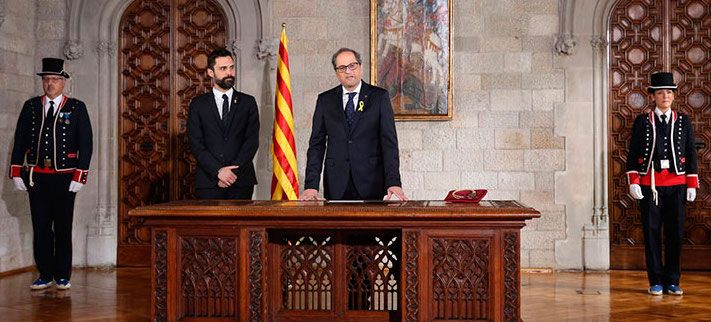
Installation of Quim Torra as president of Catalonia on May, 17, 2018. (Generalitat de Catalunya, Wikimedia Commons)
Harrington: Spain’s acting prime minister, Pedro Sánchez, has said that the conflict in Catalonia is actually a conflict among Catalans, in which a minority — those in favor of independence — are seeking to impose their will upon a majority that wishes to have Catalonia remain part of Spain.
Torra: No, it is a problem of democracy stemming from the fact that the people are not allowed to express their political desires democratically. If one thing has become clear over the last few years, it is our society’s capacity to engage in debate — often times under very difficult circumstances — while continuing to perform economically and culturally at perhaps its highest level ever.
Harrington: Another often-heard interpretation of the Catalan crisis is that it is part of a more generalized crisis the Spanish constitutional order established in 1978. Other critics describe it as a symptom of a broader European, and perhaps even world-wide crisis of long-established ways of governing.
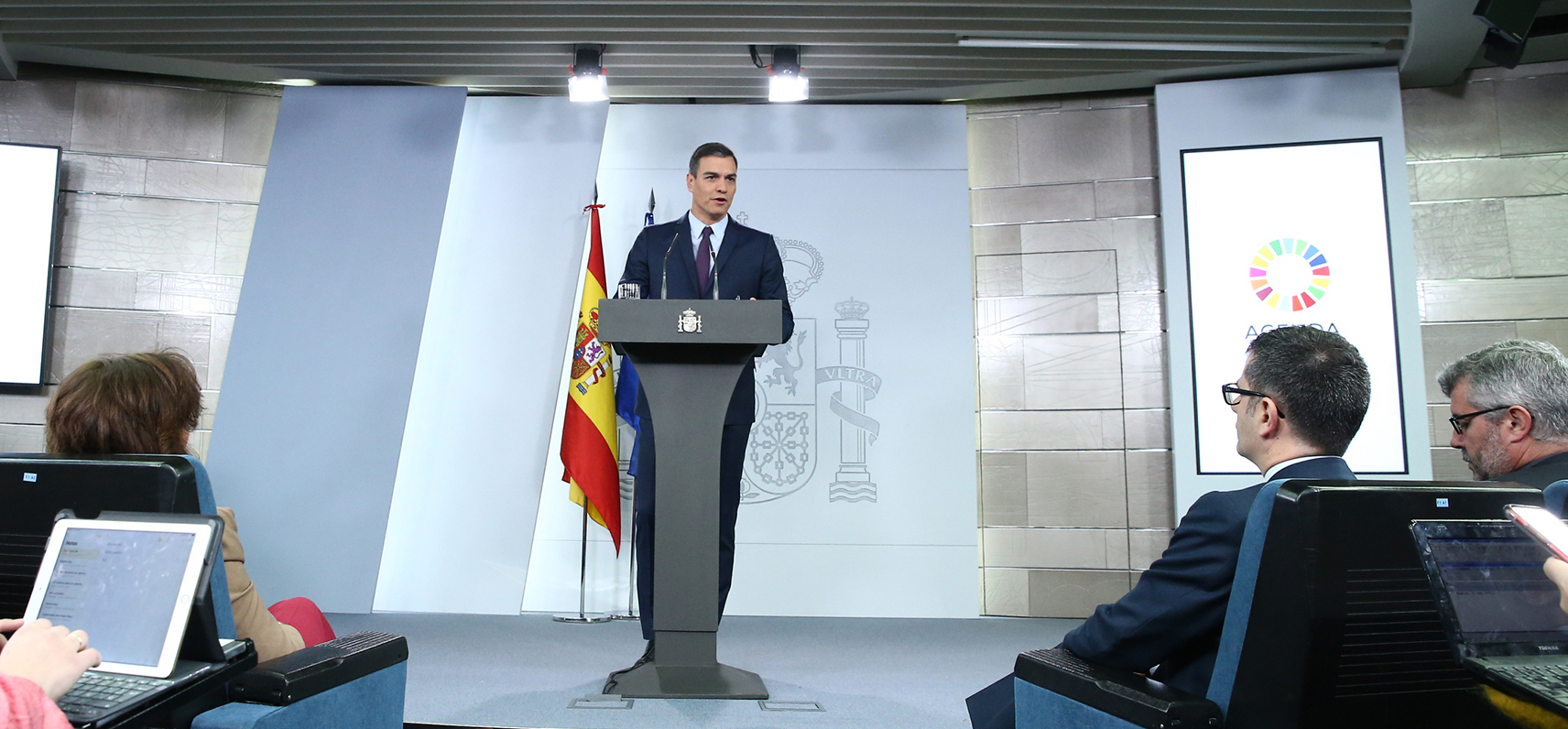
Prime Minister Sánchez announcing a snap election for 28 April 2019. (Spanish Ministry of the Presidency, Wikimedia Commons)
Torra: I think it is a mixture of all of these things. I believe the Catalan independence movement has laid bare the reality of the Spanish transaction — not the transition — that resulted in the adoption of the Spanish Constitution of 1978. This was made quite clear to me when I visited Portugal and held conversations with members of the National Assembly from across the political spectrum. From left to right, all have accepted a total break with [António] Salazar’s dictatorial regime [1932–1968].
The Spanish state’s problem is that this break did not take place. It carried out a reform that kept intact several important bastions of Francoism and an authoritarian way of approaching public life and politics, something we can see quite clearly in the comportment of the state judicial and police sectors. We can also see it in the very figure of the king, who is the inheritor of prerogatives derived directly from the Franco regime and whose presence has deprives all Spaniards of the right to decide whether they wish to live in a monarchy or a republic. All of this has become more evident as a result of the rise of the Catalan independence movement, which has brought this not always visible Francoism, which is profoundly rooted within the organs of the state, to the surface.
That said, there is an aspect of the independence protest that is related to the current global wave of political dissatisfaction. Here we are in the 21st century in a globalized world where we no longer live in isolated outposts of the planet, but rather where we have global flows of information, and the people want to live in places where there is freedom and where they can be part of a social project defined by adhesion rather than repression. We must be very attentive to the will of the people. As I said, people want to participate in public life. But right now, there is widespread distrust of the political class in general, and the Spanish and Catalan political classes in particular. And this helps explain the large protests we are seeing in the streets of Catalonia today.

Special Senate Commission on the Invocation of Article 155 of the Spanish Constitution (presidency). (Partido Popular de Melilla, CC BY-SA 2.0, Wikimedia Commons)
Harrington: How would you describe the performance of the Spanish judicial system in the recently concluded trial of the Catalan politicians and civil society leaders in Madrid?
Torra: I would begin by recalling the words of the president of the General Council of the Spanish Judiciary, Carlos Lesmes, when he said that the Spanish constitution is based on the sacred and indivisible unity of the fatherland and that the judicial powers have the obligation of preserving this unity above all other things. Nothing about preserving the people’s will.
We have, rather, the idea that Spain is based on an a priori notion — the unified fatherland — and not the desires of its citizenry. I think it sums things up perfectly. I think the Spanish judiciary has appointed itself as the royal guardian of the indivisible unity of Spain, and for this reason gives itself the right to use any and all means achieve this end, including twisting decisions and opinions as they see fit.
Under these parameters, anything can be portrayed as suspicious and therefore all things are seen as potentially prosecutable. And when the police can’t achieve the desired end, the prosecutors are sent in. And when the prosecutors fall short, they revert to the full force of the courts. And when we talk about the objectives of their prosecution, we are talking not only about expressions of democratic will like the vote on Oct. 1, 2017, but also about ideas and even banners bearing messages they do not like. For example, they have prohibited, under threat of prosecution, any discussion about the right of self- determination from taking place in the halls of my government or in the Catalan Parliament.
Harrington: Since the Supreme Court handed down the sentence in the case of the seven former Catalan government ministers and two civil society leaders on Oct. 14, the streets of Catalonia have been consistently filled with protestors. How would you describe what is going on?
Torra: It speaks of a sense of enormous anger about the fact that honorable politicians who were following a democratic mandate — the entire process that led toward October 1was approved by an absolute majority of the Catalan Parliament — will each be spending nine to 13 years in prison. It has unleashed an enormous wave of indignation in Catalan society. And this is what we are seeing in the streets
Harrington: Pedro Sánchez, the head of the interim Spanish government, suggested that these protests are of an fundamentally violent character, and his interior minister, Fernando Grande–Marlaska, recently said, and I quote, “The violence in Catalonia has been of greater impact than that which took place in the Basque Country.” How do you respond to these comments? Are you, as Spanish government sources and certain members of the press have recently suggested, an apologist for this supposed violence?
Torra: To compare occurrences that have taken place in a given moment in Catalonia with deaths and assassinations in the Basque Country over years, is absolutely appalling. And this is why the Spanish associations of victims have called on the government to stop its banalization of their tragedy.
Harrington: To what extent must the ongoing protests and disturbances in the streets of Catalonia be seen as a demonstration of the failure of the Catalan political class and/or the political class of the Spanish state? Can we speak of any large errors committed by one or both parts of this equation?
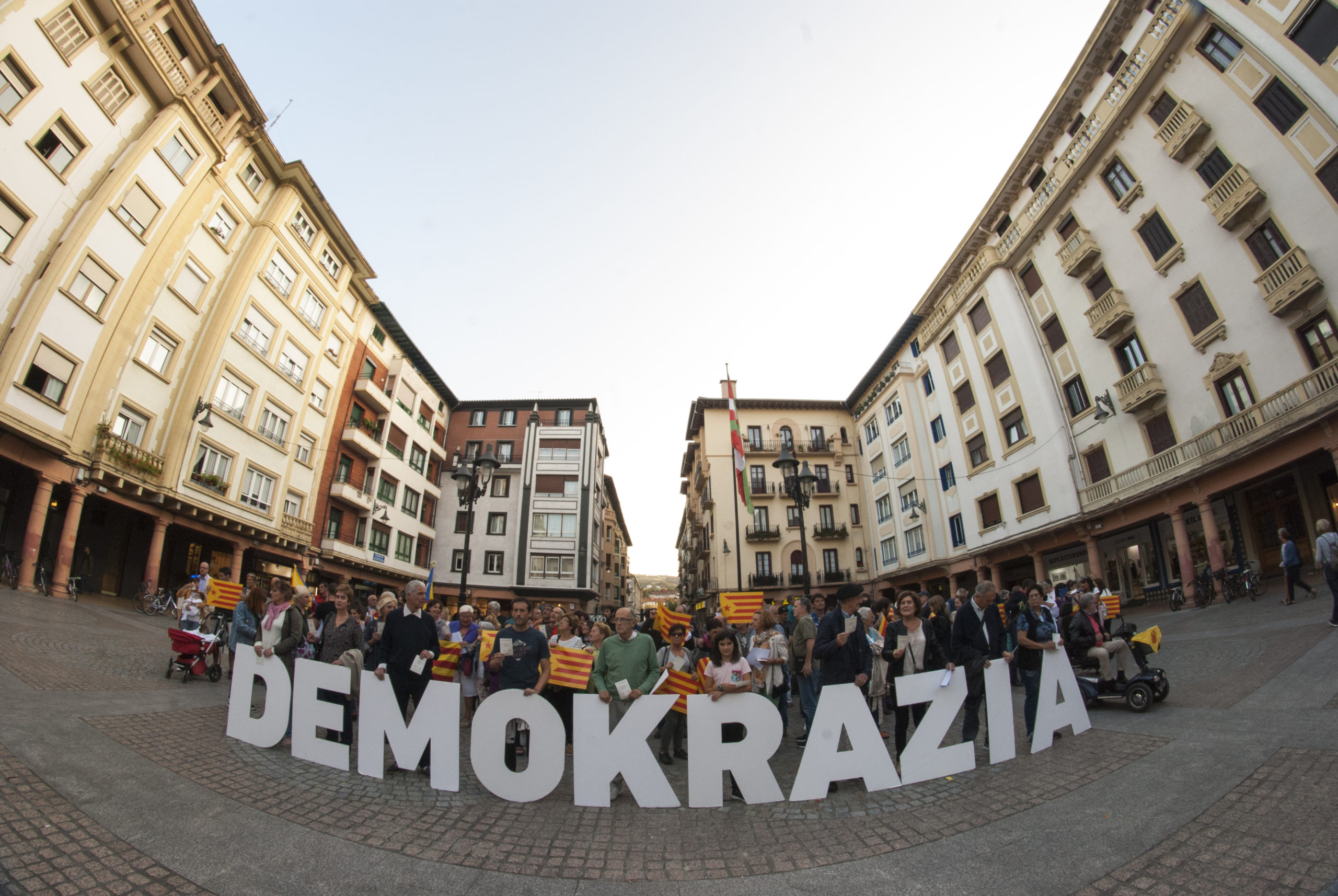
One of many gatherings across the Basque Country in support of the Catalan vote. (Theklan, CC BY-SA 4.0, Wikimedia Commons)
Torra: These critiques no doubt have some basis in truth. But the roots of the conflict can been found in in our not having had the opportunity, as should have been the case from the very beginning, to decide things in a frank and honest fashion, allowing those in favor of remaining in the kingdom of Spain and those in favor of independence to place their arguments on the table and to let the citizens of Catalonia would decide which solution is best. In this scenario, each would have their say and both options would be considered respectable. The citizens must decide.
I can assure you that if we were to have such a referendum and it were to show that a majority of Catalans would prefer to continue as part of Spain, I would resign immediately as the president of the Generalitat.This is the basis of the conflict. And there really is no other. The 2 million Catalans in favor of independence are not going to disappear. In the last four elections, counting local, Catalan, Spanish and European elections, pro-independence forces have won. In short, Spain must realize that the institutional instability from which it is currently suffering will continue as long as it refuses to listen to the voices emanating from Catalonia.
Harrington: But don’t we also have to talk about the instability present in your own governing coalition?
Torra: Without a doubt. Governing in a coalition obviously makes things more complicated. But I think it is important to remember that we Catalans have been up to the challenges posed by these complications. We have been able to forge governing pacts between groups of widely differing ideological stripes. [When this interview was conducted the post-1978 Spanish democracy had never had a coalition government. This changed last week when Pedro Sánchez joined with Podemos to form a government.]
… Of course, to govern by coalition, you first have to sit down and come up with agreements and put them into action. Obviously, in a legislature like present one in Catalonia, shadowed by the reality of political prisoners and exiles, disagreements and controversies arise. But despite this my government engaged in, and survived, a no confidence vote about a month ago. And here we stand.
Harrington: You have been indicted by the Spanish state for actions you have taken during your presidential mandate. What is the crime that you are alleged to have committed?
Torra: My crime is that of defending freedom of expression by refusing a Spanish government order to remove a banner placed on the balcony of the Palace of the Generalitat that spoke of “political prisoners” and that expressed a desire for the return of the “exiles.” And since I believe that there is no such thing as a small battle, I felt a need to press this struggle for the freedom of expression to its logical conclusion. So, I disobeyed the stipulations that they had sent me. And I am now involved in a trial that, if I lose it, will result in my being barred from occupying public office for a specified amount of time.
Thomas S. Harrington is professor of Hispanic studies at Trinity College. He is the author most recently of “A Citizen’s Democracy in Authoritarian Times: An American View on the Catalan Drive for Independence” (2019).
An earlier version of this article was published by The Village.
Please Donate to the Winter Fund Drive.
Before commenting please read Robert Parry’s Comment Policy. Allegations unsupported by facts, gross or misleading factual errors and ad hominem attacks, and abusive or rude language toward other commenters or our writers will not be published. If your comment does not immediately appear, please be patient as it is manually reviewed. For security reasons, please refrain from inserting links in your comments, which should not be longer than 300 words.

Given Catalonian history they should have independence if a majority vote for it. Seems to be a problem keeping the ballot boxes out of the hands of Spain. Mail-in ballots or internet voting perhaps? Spain will question the count if it can’t prevent it.
Torra and his politics do not represent the majority of CataLonia. Mass destruction of public and private property during the the recent riots in CataLonia were never condemned by Torra and his party. He had a chance in his position to do right by all in CataLonia to condemn the anarchists within his movement and chose to be silent on the subject. He needs to Go!!
I am curious to learn, as Spain is taking part, as a member of NATO, in Trump’s increasing hostility in the Middle East, whether Catalonia is on board with these plans, or if its bid for greater (if not total) independence might also include some desire to separate itself from the “coalition of willing” vassal states ever anxious to please the Indispensable & Exceptional Hegemon?
I should like to imagine that a society’s interest in independence might possibly permit such a society to be less willing to attack and subjugate other societies.
Especially as there is an example, more that one, that suggest independence is valued only for certain, special, humans and is to readily be denied to others, if those “others” are deemed to be of lesser worth …
When a people contemplate a change to self governance, it might be a wise thing to ponder how, should they achieve it, that they might deal with others who also seek the freedom to exist and to choose, to determine their own destiny, even more so when life and death issues, like war (and other things) are in the offing.
I realize that this might seem a frivolous and tangential issue, yet does it not go right to the heart of freedom and responsibility, to liberation and human well-being?
I suspect that those who believe that they have a covenant with some deity or other, are less motivated to consider or ponder this question, leaving it to the deity to “sort it out”. Yet, those who seek a place of their own, a land or a region, cannot be immune to understanding that same desire, that same yearning in is manifest, as well, for others, wherever those others may live.
If an appreciation life and freedom, if a desire for independence and autonomy exist in the hearts of some, then how may we doubt that these appreciations and desires do not exist in the hearts of all who do not wish to dominate or be dominated?
This article is much appreciated for providing perspective around a reality that has had little substantive coverage from the U$ MSM which has other oligarchic responsibilities to attend to, in terms of manipulating the understanding of U$ians and limiting the range of conversations and concerns which it goes will occupy the U$ public.
What is actually going on elsewhere, in other places, such as in France or in Spain, is effectively ignored while yet evennither places are subject to the prevailing propaganda which the oligarchs wish the many to imbibe, such as in Iran, Irak, Venezuela, Brazil, and so on.
Thus, more nuanced and deeper explorations such as this article provides are indispensable to furthering genuine awareness and broader grasp of what others, all around the world, are dealing with, confronting, or enduring.
Again, mynappreciation to the author and to CN for providing us insight and a sense of connection.